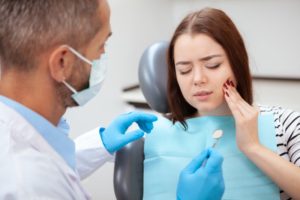
Many general health problems, such as the common cold, go away on their own after a few days. For dental health issues, on the other hand, the opposite is true. Cavities, gum disease, and other oral infections usually worsen without treatment from a dental health professional. That’s why, if you have a gum or tooth infection, you should seek help from your emergency dentist promptly. One common mouth infection is called a dental abscess, which often appears as a red, swollen, pus-filled bump on the gums. While you could potentially handle it at home, it often requires professional treatment. Here’s how to know when you should see a dentist for your abscess.
Why Do I Have a Dental Abscess?
Abscesses are one of your body’s ways of responding to an injury or infection. Common causes of dental abscesses include:
- Untreated cavity in a tooth
- Infection in a tooth’s root
- Contaminated mouth injury
- Surgical site infection
- Object that got stuck in the teeth or gums, such as a piece of food
How to Treat a Dental Abscess at Home
While it may be tempting to pop the abscess like you would a normal pimple, doing so could actually increase your pain by allowing the infection to spread. Instead, wet a washcloth in warm water and hold it to the area several times a day. The warmth might encourage the abscess to open up and drain. If it does, you can use a gauze pad to absorb pus.
To soothe discomfort, it may help to rinse with a saltwater solution a few times daily. Taking an over-the-counter pain medication like ibuprofen or acetaminophen can reduce pain as well as inflammation.
When to See a Dentist for Treatment
The truth is you should call your dentist as soon as you suspect you have an abscess. More often than not, dental abscesses are caused by an infection in the mouth, which may include untreated or undiagnosed cavities. Because of this, professional dental care is required to address the underlying cause of the abscess.
However, if you have a high fever and can’t get in touch with your dentist right away, go to the nearest emergency room. Waiting too much longer for treatment could cause the infection to spread. This is especially true if you’re immunocompromised, such as if you have diabetes, HIV/AIDS, or are going through chemotherapy. If this is the case, your body may not be able to properly fight off the infection.
A dental abscess is a sign that something is wrong in your mouth. If you notice any signs of discomfort in your teeth and gums, contact your emergency dentist immediately.
About the Practice
At Exceptional Dentistry & Sedation Center, our team of three skilled dentists is skilled in various treatments designed to deal with dental abscesses, such as root canal therapy. We also offer multiple sedation options to soothe any anxiety you may have about getting treated. If you think you might have a tooth infection, contact our Gainesville, FL office at (352) 332-6725 for prompt care.

